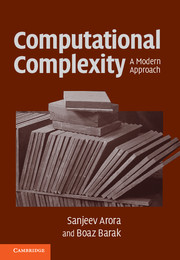Book contents
- Frontmatter
- Contents
- About this book
- Acknowledgments
- Introduction
- 0 Notational conventions
- PART ONE BASIC COMPLEXITY CLASSES
- 1 The computational model – and why it doesn't matter
- 2 NP and NP completeness
- 3 Diagonalization
- 4 Space complexity
- 5 The polynomial hierarchy and alternations
- 6 Boolean circuits
- 7 Randomized computation
- 8 Interactive proofs
- 9 Cryptography
- 10 Quantum computation
- 11 PCP theorem and hardness of approximation: An introduction
- PART TWO LOWER BOUNDS FOR CONCRETE COMPUTATIONAL MODELS
- PART THREE ADVANCED TOPICS
- Appendix: Mathematical background
- Hints and selected exercises
- Main theorems and definitions
- Bibliography
- Index
- Complexity class index
8 - Interactive proofs
from PART ONE - BASIC COMPLEXITY CLASSES
Published online by Cambridge University Press: 05 June 2012
- Frontmatter
- Contents
- About this book
- Acknowledgments
- Introduction
- 0 Notational conventions
- PART ONE BASIC COMPLEXITY CLASSES
- 1 The computational model – and why it doesn't matter
- 2 NP and NP completeness
- 3 Diagonalization
- 4 Space complexity
- 5 The polynomial hierarchy and alternations
- 6 Boolean circuits
- 7 Randomized computation
- 8 Interactive proofs
- 9 Cryptography
- 10 Quantum computation
- 11 PCP theorem and hardness of approximation: An introduction
- PART TWO LOWER BOUNDS FOR CONCRETE COMPUTATIONAL MODELS
- PART THREE ADVANCED TOPICS
- Appendix: Mathematical background
- Hints and selected exercises
- Main theorems and definitions
- Bibliography
- Index
- Complexity class index
Summary
What is intuitively required from a theorem-proving procedure? First, that it is possible to “prove” a true theorem. Second, that it is impossible to “prove” a false theorem. Third, that communicating the proof should be efficient, in the following sense. It does not matter how long must the prover compute during the proving process, but it is essential that the computation required from the verifier is easy.
– Goldwasser, Micali, and Rackoff, 1985The standard notion of a mathematical proof is closely related to the certificate definition of NP. To prove that a statement is true one provides a sequence of symbols on a piece of paper, and the verifier checks that they represent a valid proof/certificate. A valid proof/certificate exists only for true statements. However, people often use a more general way to convince one another of the validity of statements: they interact with one another, where the person verifying the proof (called verifier from now on) asks the person providing it (called prover from now on) for a series of explanations before he is convinced.
It seems natural to try to understand the power of such interactive proofs from the complexity-theoretic perspective. For example, can one prove in a succinct way that a given formula is not satisfiable? This problem is coNP-complete, and hence is believed to not have a polynomial-sized proof in the traditional sense.
Information
- Type
- Chapter
- Information
- Computational ComplexityA Modern Approach, pp. 143 - 171Publisher: Cambridge University PressPrint publication year: 2009
